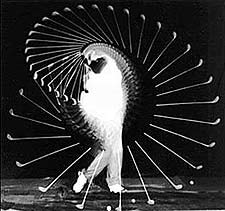
from Attention and Motor Skill Learning, by Gabriele Wulf
“Not very many studies have dealt with the effectiveness of internal versus external foci of attention in “expert” performers. In our study with novice and advanced volleyball players, we found that the two groups of performers benefited equally for feedback inducing an external focus rather than an internal focus in learning a volleyball serve (Wulf et al., 2002, Experiment 1). Similarly, individuals with experience in soccer showed improved learning (lofted soccer pass) when provided with feedback that induced an external relative to an internal focus (Wulf et al., 2002, Experiment 2). Finally in one of our golf studies (Wulf, in press, Experiment 2), we had expert golfers, with handicaps of or around 0, perform pitch shots. Similar to what we had done in the first experiment in that study (Wulf, in press, Experiment 1; see chapter 2), we asked the golfers to focus either on the swing of the club (external focus), on the swing of their arms (internal focus), or on what they normally focused on (control condition). All expert participants performed 20 shots under each condition. The results showed that the experts were more accurate when they adopted an external focus compared to the two other conditions, which resulted in similar accuracy scores. This is interesting because it shows that performance can be improved through external focus instructions not only at the beginning stages of learning, but even at a high level of expertise” pg 141-142
“Based on the findings discussed in this chapter (as well as those related to instructions discussed in chapter 2), one recommendation for applied situations seems clear: Wording feedback so that it promotes an external focus should lead to more effective performance and learning than feedback that directs attention to the coordination of the individual’s body movements. For example, attention could be directed to the motion of an implement (e.g., golf club, baseball bat, badminton racket), the spin or trajectory of a ball (e.g., table tennis ball, football, soccer ball), or the amount of force exerted against an object (e.g., pole used in pole vaulting, springboard, punching bag). Not only novices, but even advanced performers, appear to benefit from feedback inducing an external focus”
pg 104
Learn from the top Sports Performance and Sports Medicine Professionals at the 2013 BSMPG Summer Seminar May 17 & 18, 2013!
Remember to book your hotel now before rooms get filled with area college graduations.



